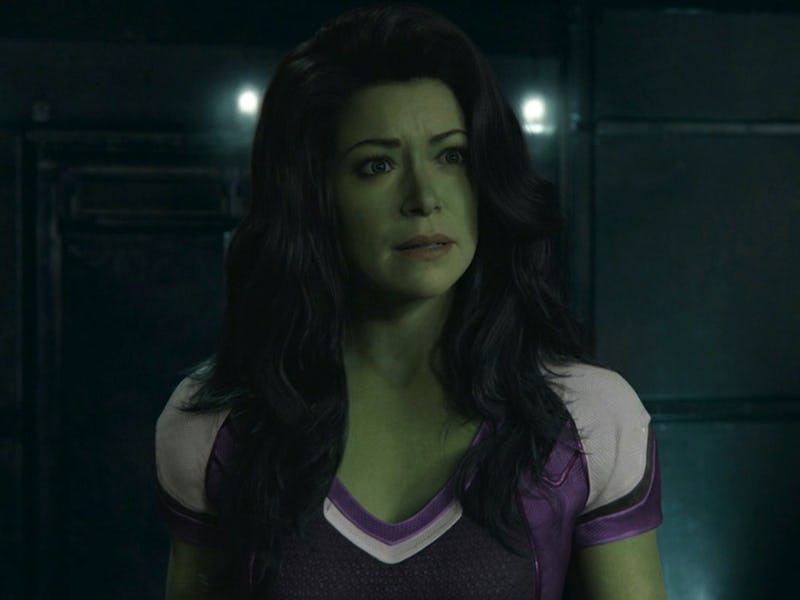She-Hulk Episode 9’s biggest twist could finally fix Marvel’s worst habit
Let’s talk about the K.E.V.I.N. in the room, shall we?

In its Season 1 finale, She-Hulk: Attorney at Law boldly goes where no other Marvel Cinematic Universe title has before: Marvel Studios.
Indeed, the Disney+ series’ final installment climaxes with Jennifer Walters (Tatiana Maslany) taking full control of her own TV show by breaking through every barrier and forcing her way onto the Walt Disney Studios lot. Her quest eventually leads her not only into the She-Hulk writers' room but also onto a darkly lit soundstage controlled by the secret head of Marvel Studios: an A.I. machine known as K.E.V.I.N.
Throughout the conversation that follows, Jennifer convinces K.E.V.I.N., an A.I. riff on real-life Marvel Studios head Kevin Feige, to rewrite the She-Hulk finale on the spot by removing all of its superfluous action elements and making it more focused on her. The scene not only sees She-Hulk hit the peak of its own meta streak, but it also gives the Disney+ series the chance to cheekily address one long-running MCU complaint.
Introducing K.E.V.I.N.
Introducing K.E.V.I.N.
When K.E.V.I.N. meets Jen in the She-Hulk finale, the AI machine tells Maslany’s superhero, “I possess the most advanced entertainment algorithm in the world and it produces near-perfect products.” In response, Jen notes, “It’s often said that Marvel movies all end the same way.”
Jen’s comment helps her convince K.E.V.I.N. to cut all the unnecessary “plot” and “flash” out of the “original” She-Hulk finale. By doing so, Jen manages to create a new kind of MCU ending, one that exists in direct opposition to the franchise’s usual formula, which has weighed down many of Marvel’s past films and TV shows.
Roasting the Marvel Formula
Jennifer Walters (Tatiana Maslany) finds herself in Marvel Studios’ headquarters in the Season 1 finale of She-Hulk: Attorney at Law.
Marvel’s proclivity for ending its film and TV titles with unnecessarily oversized action set-pieces and superhero fights has been a topic of conversation among both critics and casual viewers alike for years. However, the issue became unavoidable once the MCU’s slate expanded to include a frankly unfathomable amount of Disney+ originals.
Now, it’s not just movies like Black Widow and Shang-Chi that are ending in such incongruously massive ways, but also Disney+ shows like Moon Knight, WandaVision, Hawkeye, and Ms. Marvel.
The increased number of MCU titles has, in other words, made the franchise’s previously inconsequential flaws constantly, unavoidably apparent. For that reason, even though She-Hulk: Attorney at Law still features more than its fair share of issues, its fourth-wall-breaking structure has, nonetheless, allowed it to directly acknowledge one all-too-common MCU problem.
She-Hulk: Attorney at Law Episode 9 brings Jennifer Walters (Tatiana Maslany) face-to-face with the real boss of Marvel Studios.
The Inverse Analysis — There are, of course, conversations to be had about how successful She-Hulk’s finale really is. For all its strengths, even the episode’s K.E.V.I.N. sequence contains moments in which it’s unclear how far the show’s self-awareness actually goes. K.E.V.I.N.’s use of the word “products” when discussing the MCU’s films and TV shows feels, for instance, more like an unintentional acknowledgment of the Marvel production machine than a playfully meta jab.
That said, there’s still something undeniably admirable about the She-Hulk finale being so willing to directly address some of the issues that have long plagued the very franchise it’s a part of. Hopefully, K.E.V.I.N. will take Jen’s suggestions to heart.
She-Hulk: Attorney at Law is streaming now on Disney+.
This article was originally published on